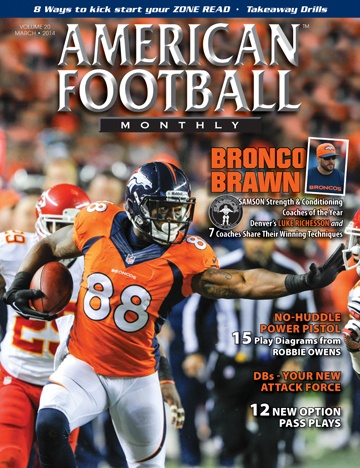Safety First: Good Nutrition – Part of Your Health and Safety Plan
by: AFM Editorial Staff©
More from this issue
Practicing proper nutrition is one way to help athletes recover from workouts and prevent injuries.
Eating right is an essential part of a comprehensive athletic training regimen. It’s widely recognized that the “fuel” that is consumed by athletes prior to and following training is a critical element in allowing them to perform at their highest level and recover effectively from punishing workouts. Proper nutrition is also a player safety issue, as athletes who eat right, hydrate right and maintain top physical condition are less likely to experience certain medical conditions or injuries.
To shed light on proper nutrition practices for athletes, AFM talked to two members of the Collegiate and Professional Sports Dietitians Association, Jana Heitmeyer and Becci Twombley.
For Heitmeyer, Director of Sports Nutrition at the University of Missouri, the focus is working with members of the Tiger football team to ensure they are getting the right food in the right quantities. Hydration and workout recovery are other areas where her expertise as a Registered Sports Dietician is utilized to help athletes maximize their performance.
While she doesn’t monitor everything an athlete eats, Heitmeyer does work with individual players to establish dietary guidelines that will help them meet their individual goals. An important part of her job is education – teaching athletes about the benefits of proper nutrition and how it can affect performance.
At USC, it’s Director of Sports Nutrition Becci Twombley who makes sure that athletes have the knowledge, the resources and the products to help them deal with the rigorous Trojan training programs and high performance standards.
AFM: How important is good nutrition for athletes that want to perform at the highest level?
Heitmeyer: Nutrition is the one thing that will set you apart from other elite athletes. Everyone is in college because their skill level is high and they are more talented than most. Everyone trains hard, everyone conditions hard, but we can’t be with the athletes 24 hours a day. The ones that stay the healthiest, recover from practice to practice and game to game the best and repeatedly perform the best are the ones that make nutrition as important to them as film, rehab, conditioning and practice.
Twombley: Proper fueling allows athletes to perform at their highest potential more consistently. Most athletes know that training hard is vital to their performance. What they don’t always realize is that, without good recovery nutrition, they are not benefiting from their training to the fullest extent.
How do good nutritional practices help athletes recover from practice or games?
Twombley: From a nutrition standpoint, recovery begins before the training session begins. Loading glycogen stores in the muscle prior to training decreases the amount of breakdown that occurs during training. If the muscle is less beat up, all it has to do is grow. Strength and size gains are much greater when an athlete fuels for training each day. Post training, replacing carbohydrate and protein quickly is vital. We aim to get at least 60g of carbohydrate and 20g of protein in each of our football players post training. This allows the muscle to repair quickly (from the protein) and to reload energy (from the carbohydrate). Adding antioxidants with fruit or fruit juice will help the body rid itself of the free radicals that were produced from the intense training.
What should high school coaches be doing differently to help football players succeed nutritionally?
Heitmeyer: Most high school kids want to get bigger and stronger. High school coaches should emphasize breakfast, real food first, and hydration. If they want a supplement, protein is the only thing we recommend. At least ninety percent of the time, the first thing we work on is eating breakfast. Empty tanks do not provide the energy needed to improve. Second thing is eating consistently three meals a day plus a pre-workout snack, then a bedtime snack. We emphasize peanut butter and jelly sandwiches as snacks instead of weight gainer supplements. Drinking water is the third thing we talk about on a daily basis. Since our muscles are made of water, they need to get in the habit of drinking water all the time, not juice or pop or energy drinks or even sports drinks.
Twombley: High school coaches should communicate with words and actions to their players that nutrition matters. Often the coach will comment on an athlete’s meal choice or weight, while slurping down a Monster Energy drink, or finishing up their “Drive-thru” dinner meal. If the coaches demonstrate that fueling is important to them, the athletes will be much more likely to adhere to a sound nutrition program. Coaches should also look for a good nutrition resource for their athletes. Find a local registered dietician that specializes in sports and invite them to practice to speak for a few minutes. A small investment can make a huge impact on a team. The bottom line is that sports nutrition should be as much a part of a high school team as sports medicine or strength and conditioning.
Is there something that coaches and athletes can do nutritionally that can contribute to greater stamina and endurance late in the game?
Heitmeyer: Hydration is a huge contributor to fatigue during game. Hydration needs to start, at the latest, two nights before the game and focus on maintaining clear urine until after the game. Focusing on recovery throughout the week and not just the day of the game is also important. Lastly, you can maintain your energy levels by snacking during halftime on things like bananas, gummies, and Muscle Milk RTDs and bars.





